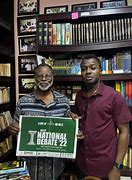In the world of politics, alliances and endorsements can often be as intriguing as they are perplexing. Recently, the landscape in Nigeria has been buzzing with fervor over the endorsements received by President Bola Tinubu. This wave of support has not gone unnoticed, especially by Udenta Udenta, the founding National Secretary of the Alliance for Democracy.
Udenta did not mince words when he suggested that these endorsements are a clear sign that the Federal Government is in panic mode as the 2027 election approaches. In a recent appearance on Channels Television’s The Morning Brief, Udenta expressed his concern over this early show of support for President Tinubu. He remarked,
“We have virtually two years or slightly less into the election; the regime panicked, that’s why it went into election mode two years ahead of time.”
The timing of these endorsements seems to have struck a nerve with Udenta, who predicted earlier that President Tinubu would govern for less than two years — a prediction that has seemingly come to fruition. Udenta further elaborated on this point by stating,
“So, the defections, endorsements, calibrations, and re-endorsements will continue in perpetuity until the election season is upon us.”
As political analysts dissect these developments and try to read between the lines of these strategic moves, one cannot help but wonder about their implications for Nigeria’s political future. The nexus between power play and public sentiment is always ripe ground for debate and speculation.
Expert opinions add layers to this already intricate narrative. Activist lawyer Deji Adeyanju weighed in on the unfolding drama by highlighting Peter Obi’s potential impact on former Vice President Atiku Abubakar’s political aspirations in 2027. Adeyanju described Obi as
“the weapon fashioned against his counterpart,”
hinting at possible obstacles awaiting Atiku down the road.
It appears that alliances are being forged and strategies are being crafted well in advance of what promises to be a hotly contested election cycle come 2027. The dynamics at play underscore how crucial each move can be in shaping not just individual candidates’ destinies but also impacting larger political landscapes.
As tensions rise and allegiances shift in Nigerian politics leading up to what is sure to be a pivotal moment in its democratic journey, one thing remains certain: every step taken today could echo through history tomorrow.









Leave feedback about this